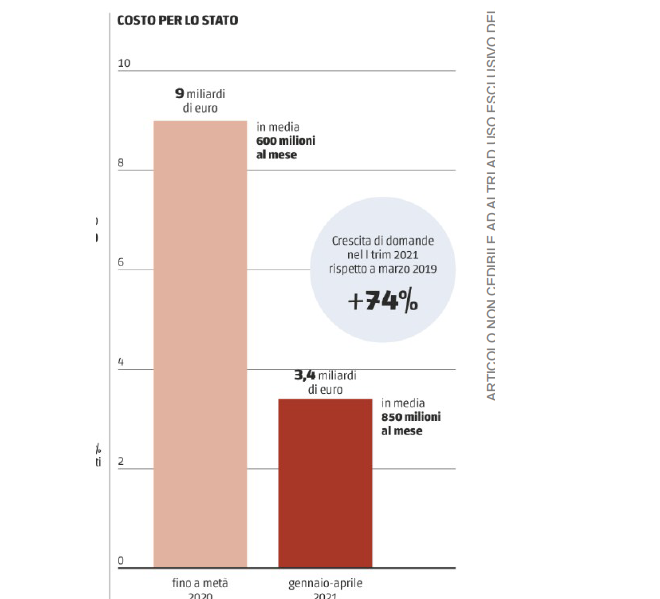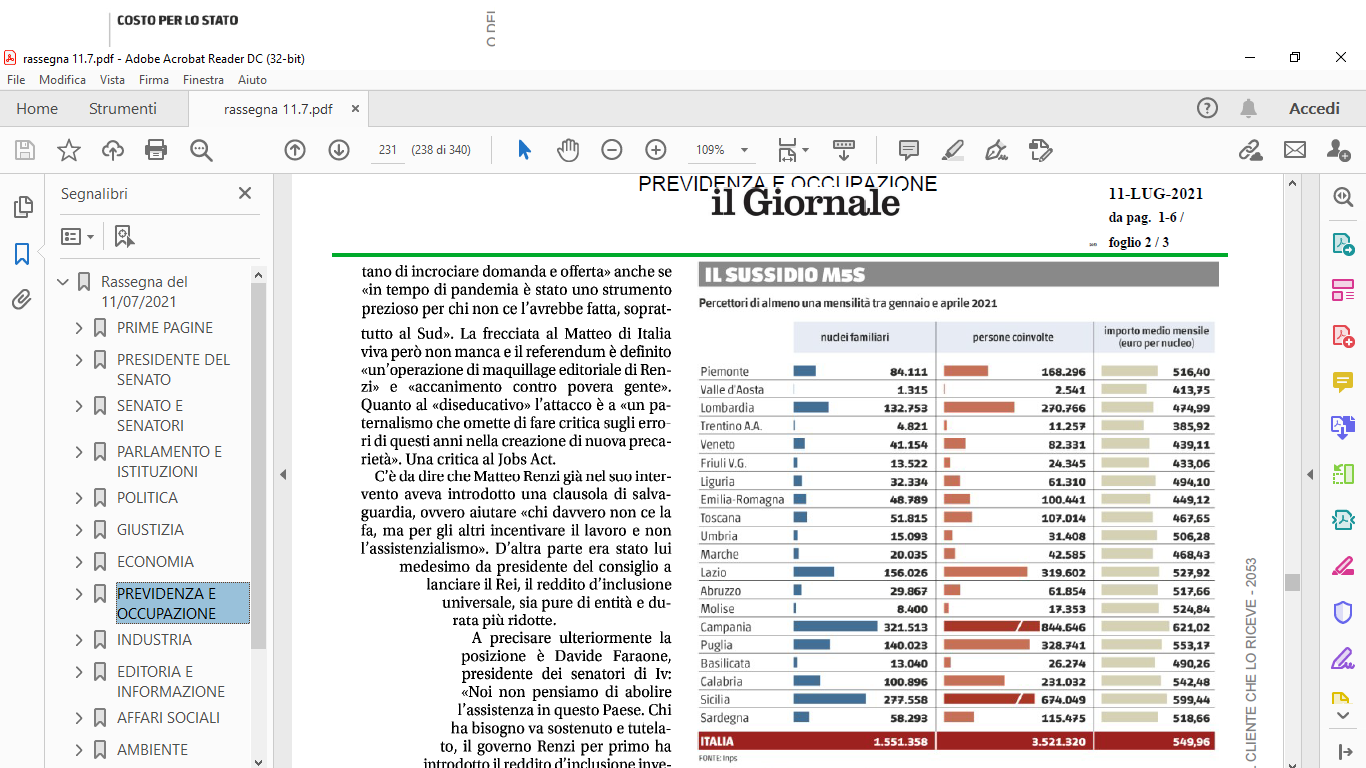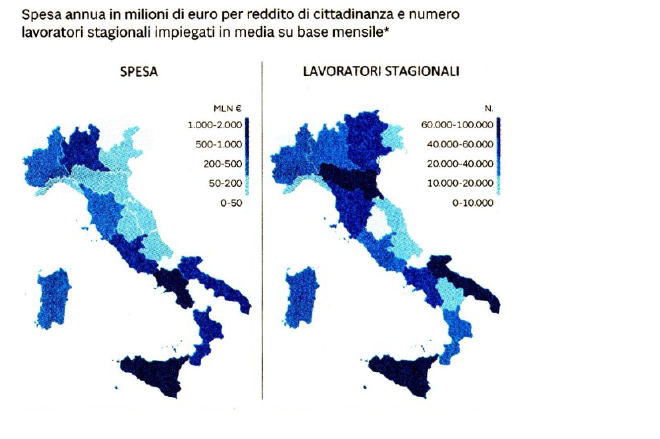Citizenship Income: to be reformed, to be completed, but we do not cancel the universal guarantees


Renzi announced that, after the presidential elections of February 2022, he will propose a referendum for the abolition of citizenship income. Renzi is the personification of cunning because he launches a strong theme, but putting it in a future in which he may very well have forgotten about it.
Yet the "Citizenship Income"; flag of the Conte 1 government and of the Five Stars would deserve a reform, a completion, an inclusion in a broader economic and employment policy, but not a cancellation. The first reform could be in the name, given that the "Citizenship Income, is not a citizenship income, or universal, given to everyone regardless of the work or income situation, but it is an extended unemployment benefit granted only to those with low incomes. and has no savings. So a first reform should be to change the name also to start getting used to calling things for what they are. Truth is a very precious exercise in Italy today. Secondly, we consider that if we canceled the RdC we would return to forms of compensation, however expensive, such as NASPI that did NOT cover certain social categories particularly affected, for example, by the covid-19 crisis, such as self-employed workers or employees of small businesses. under 15 employees. We risk going back to dividing the unemployed into lucky, protected, and desperate. It doesn't seem like a step forward.
What is contested in the current form of the RdC?
a) the fact that it costs a lot, but does not carry over to employment, with a lack of active labor policies;
b) at least a particular geographical distribution;
c) the fact that, as we have read, with the RdC "There are no longer those who do seasonal jobs at 600 – 700 euros per month".
Let's start from point a) trying to provide some information about the cost of the RdC, its use and how it could be improved. Let's start with the cost and compare with that of the German Harz IV social protection system.

To the Italian state it costs 9 billion. Harz IV cost Germany 12.6 billion in 2018, and we are confronted with a country that is hungry for work and where Harz IV therefore really goes to cover temporary situations. We also have to deal with long-term unemployment in certain areas of the country that pose a truly epochal problem. Where the RdC has failed is precisely in relocation to work: the retraining courses have not started, a healthy policy of relocation of the workforce has not been made where necessary, the municipalities have not been able to create policies for socially useful jobs, which would also be necessary, from basic city maintenance to surveillance. So let's give some suggestions:
- it is necessary to take compulsory job relocation courses, without being afraid to assign them to “mature” workers as well. We need to recover the workers in their fifties who, perhaps, have been engaged in hard work for 30 years to be then cut off from the crisis or from the evolution of their sectors. Also because with the ongoing demographic decline these workers are needed waiting for someone to realize that the real, great, destructive crisis, the one that will erase us from history, is precisely the demographic one;
- whoever receives the RdC or "Universal Unemployment Allowance", a more suitable name, if he does not attend courses, must be available to the municipalities for maintenance, surveillance or general activities for at least 20 hours a week. This is to get many out of the house who, by now, have lost hope, "Re-educate" them to do something and therefore, also to obtain those minimum maintenance services that many cities and countryside need and that are no longer done. Let's think, for example, of the prevention of hydro-geological instability in rural areas, or the simple cleaning of sidewalks;
- if a municipality is unable to organize adequate activities and courses, the recipients will have to move to those municipalities that do so or, for small municipalities, there will be the possibility of organizing these services in a consortium. Obviously it should be mandatory to take part in these activities;
b) It seems absolutely true that the distribution of the RdC in the country is unequal and eccentric , both in terms of value and in terms of the number of recipients. We can see this imbalance in the following images:


Here something is wrong: two regions have a number and an average value of the RdC distributed considerably higher than the others. This is an element to be seriously investigated, because the doubt that some "Hole" in the system of assignment and control may arise, as well as some doubts of clientelism. The best way to cancel them would be the obligation to serve in the famous activities that should be organized by the municipalities, but what if these are so inefficient, or conniving, as not to organize them? At this point the service should be rendered to a state body: national parks, harbor master, state property etc. So the defaulting municipalities should be sanctioned or even dissolved.
But let's go ahead: once these regions were also the recipients of the investments of the infamous “State investments”: let's think for example of the Alfasud of Pomigliano, or of the Bagnoli steel mills. Now there is no longer any industrial policy and the result is citizenship income. When Prodi made certain decisions, did he evaluate the consequences?
c) There are no seasonal waiters, lifeguards, etc. Let's take a graph published above:

The demand for seasonal workers and the size of the RdC paid coincide in Sicily, but not in the other regions. In Emilia Romagna, for example, very few citizenship income is paid, but there is a strong demand for seasonal workers. Isn't it that you are facing a false problem? Isn't it instead that the problem is a wage dynamic that has penalized the poorest incomes? Because in the 1980s a worker took one million lire, that is, just over 500 euros today, but it is 35-40 years ago. Are we sure that the salaries offered are adequate to date? And if they are not, why does this happen? Just because employers are suicides throwing away a scarce resource like work, or because there is an economic model that doesn't work?
as for the work ethic, I learned it by being in the company since I was still in middle school, helping my extended family. Ethics is taught by example, which no longer exists. How many children do their parents follow in their business? If the work ethic is just about earning money we are taking a very dangerous slope. The work ethic is not just driven by greed and money, it is also the ability to do something to be proud of, often, not just for the money. If not, it is better to train a generation of stock market speculators, as, indeed, it is already happening.

Thanks to our Telegram channel you can stay updated on the publication of new articles of Economic Scenarios.
The article Citizenship Income: to be reformed, to be completed, but we do not cancel the universal guarantees comes from ScenariEconomici.it .
This is a machine translation of a post published on Scenari Economici at the URL https://scenarieconomici.it/reddito-di-cittdinanza-da-riformare-da-completare-ma-non-cancelliamo-le-garanzie-universali/ on Sun, 11 Jul 2021 17:43:53 +0000.
